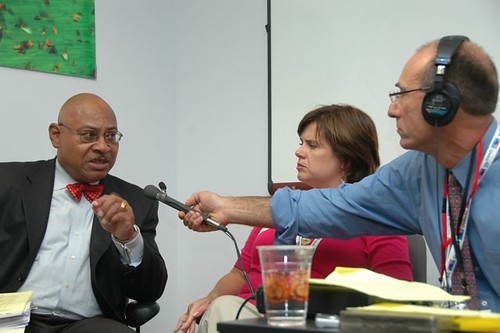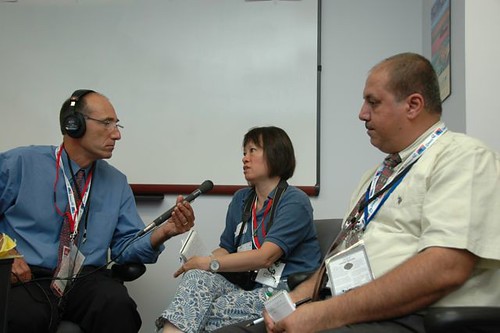Podcast: Asian Elites Weigh Issues, History and Race in the Presidential Contest
Asian voters have been called the, “new sleeping giant,” of American politics. Asians make up about 5 per cent of the US population, and their numbers are growing rapidly. But according to a recent study by researchers at UCLA, political participation by Asian Americans is significantly lower than the national average. Even so, both the Obama and McCain campaigns are reaching out to Asian voters. Lotus Chau, Chief Reporter at Sing Tao Daily in New York recently wrote brief profiles of two Asian American Democrats who have come to very different conclusions about Barack Obama’s candidacy.
For Brian Wang, a first-time delegate to the Democratic National Convention there is, “important symbolic meaning for the Asian community,” if Barack Obama becomes the first black president of United States. Wang, a lawyer from San Francisco, recalled the 1988 primary when his mother voted for Jessie Jackson for the Democratic presidential nomination. Holding a Martin Luther King-style poster which said “Change and Progress” in Chinese, Wang recalled that his mother’s Chinese friends were upset by her support of Jackson. But, he said his mother responded to her friends, “If Jessie can be the president of this country, my son also can be the president one day. Voting minority gave me hope.” Brian said he followed the same path as his mother, supporting Obama and at the same time fulfilling his own dream.
Po-Ling Ng, the director of the Open Door Senior Center, was a Democratic delegate in 2004. She is a long-time supporter of Bill and Hillary Clinton, and in 2000 supported Al Gore for president. This year she was invited to be a Democratic delegate form New York, but she refused the invitation. “Deep in my heart, I am not prepared for a black candidate as president of the country. I don’t want to spend my money and time to support someone not from the bottom of my heart. I prefer to step back and stay in New York,” she said.
A record 270 Asian American delegates attended this year’s Democratic National Convention. There appeared to be only a handful of Asian delegates at the Republican National Convention, although an exact count is not available. However, Asians are organizing on behalf of John McCain. James S. Cheng is a businessman from Virginia who is involved in efforts to build support for McCain among Asian Americans. I spoke with him about campaign strategy and the challenges facing the campaign.
Listen to an interview with James S. Cheng a strategy adviser to the Asian Americans for McCain Coalition.
[audio:http://www.jocelyngonzales.net/FI2W/fi2w_cheng.mp3]


